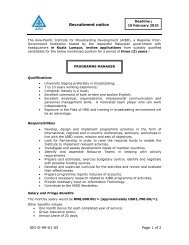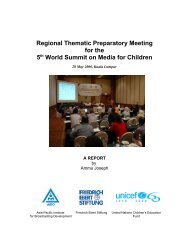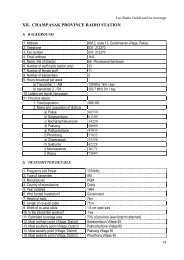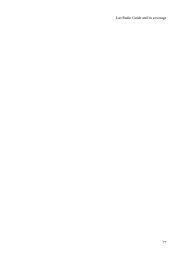FINAL REPORT Media Law to unesco july1.pdf - AIBD
FINAL REPORT Media Law to unesco july1.pdf - AIBD
FINAL REPORT Media Law to unesco july1.pdf - AIBD
You also want an ePaper? Increase the reach of your titles
YUMPU automatically turns print PDFs into web optimized ePapers that Google loves.
transformation <strong>to</strong>wards democratic governance and after the<br />
introduction of freedom of speech legislation as part of the<br />
Constitution, the media was on the forefront <strong>to</strong> criticize the<br />
government. As a result of the focus on criminal libel, many<br />
journalists were sentenced and imprisoned every week. During the<br />
general elections, the main opposition party aligned itself with<br />
Ghana’s Journalist Association for a repeal of the defamation act.<br />
On 27 July 2001, Ghana became one of the few countries, which<br />
repealed criminal libel legislation. This, as Ampem-Darko pointed<br />
out, opened a “floodgate” for Ghanaian journalists. Since then, civil<br />
libel has overtaken, with many cases concerning privacy. Ampem-<br />
Darko stressed the need for training and specifically referred <strong>to</strong><br />
activities by FES. He concluded that <strong>to</strong>day, Ghana was a country<br />
with one of the highest levels of press freedom and, speaking as a<br />
journalist himself, “we know how <strong>to</strong> defend ourselves”.<br />
GOPAL SREENEVASAN:<br />
The Malaysian lawyer commenced his speech by saying that he<br />
would provide “a very practical perspective”, one that involves the<br />
lawyer’s task of “enforcing judgments” and takes its starting point<br />
from a plaintiff’s position against the media. He first explicated<br />
that special problems would arise in the world of globalize media,<br />
especially with regard <strong>to</strong> the Internet. In general, following the<br />
Australian Gutnick vs. Dow Jones case, it is open <strong>to</strong> a plaintiff “<strong>to</strong><br />
sue in any jurisdiction where he can prove that his reputation has<br />
been harmed”. The typical weapon of a plaintiff – <strong>to</strong> obtain an order<br />
of injunction so that defama<strong>to</strong>ry statements could not be made in<br />
the future – is further complicated in the realm of the World Wide<br />
Web. In practice, it can be highly problematic <strong>to</strong> even locate the<br />
publisher of a defama<strong>to</strong>ry statement. The next step would be <strong>to</strong><br />
approach search engines. Most of them are located in the US, where<br />
the “Communications and Decency Act” guarantees “absolute<br />
immunity <strong>to</strong> any search engine when it comes <strong>to</strong> the law of<br />
defamation”, as Gopal Sreenevasan pinpointed. However, the Retkin<br />
versus Google case in the UK, which is currently pending, might<br />
change this and could even “open floodgates” in terms of<br />
jurisdiction against search engines, the lawyer said in conclusion.<br />
JACOB VAN KOKSWIJK:<br />
During his speech, Prof Dr Jacob van Kokswijk focused on the<br />
Internet as well, although he introduced himself as “representing<br />
the user”. He argued that the Internet was increasingly connecting<br />
people, providing them with new possibilities in communicating,<br />
creating and distributing content. New forms of interaction such as<br />
“personalized broadcasting” are now possible without official agents<br />
such as companies or the government, thus “empowering the<br />
user” and “bypassing the law”. New media, according <strong>to</strong> Prof van<br />
18






